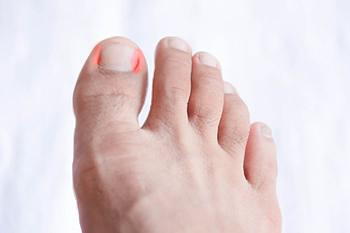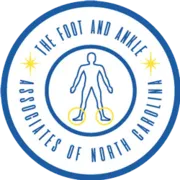 Ingrown toenails are a painful, and often an uncomfortable condition that can develop for a number of reasons. Most commonly, they will form due to tight or improperly fitting shoes, an infection, trauma, hereditary reasons, or not trimming your toenails correctly. You may notice you have developed an ingrown toenail by recognizing redness, swelling, a tender feeling on the surrounding skin, the toenail being oddly shaped, or slight bleeding or pus coming from the toenail. Some patients have found relief by packing, taping, or using nail braces to alleviate the pain. Some doctors may suggest partial or full removal of the nail, depending on its severity. For more information about ingrown toenails, we recommend you consult with a podiatrist for a proper diagnosis and advised treatment plan.
Ingrown toenails are a painful, and often an uncomfortable condition that can develop for a number of reasons. Most commonly, they will form due to tight or improperly fitting shoes, an infection, trauma, hereditary reasons, or not trimming your toenails correctly. You may notice you have developed an ingrown toenail by recognizing redness, swelling, a tender feeling on the surrounding skin, the toenail being oddly shaped, or slight bleeding or pus coming from the toenail. Some patients have found relief by packing, taping, or using nail braces to alleviate the pain. Some doctors may suggest partial or full removal of the nail, depending on its severity. For more information about ingrown toenails, we recommend you consult with a podiatrist for a proper diagnosis and advised treatment plan.
Ingrown toenails can become painful if they are not treated properly. To learn more about ingrown toenails, contact one of our podiatrists of The Foot and Ankle Associates of North Carolina, PLLC. Our doctors can provide the care you need to keep your pain free and on your feet.
Ingrown Toenails
Ingrown toenails occur when a toenail grows sideways into the bed of the nail, causing pain, swelling, and possibly infection.
Causes
- Bacterial infections
- Improper nail cutting such as cutting it too short or not straight across
- Trauma to the toe, such as stubbing, which causes the nail to grow back irregularly
- Ill-fitting shoes that bunch the toes too close together
- Genetic predisposition
Prevention
Because ingrown toenails are not something found outside of shoe-wearing cultures, going barefoot as often as possible will decrease the likeliness of developing ingrown toenails. Wearing proper fitting shoes and using proper cutting techniques will also help decrease your risk of developing ingrown toenails.
Treatment
Ingrown toenails are a very treatable foot condition. In minor cases, soaking the affected area in salt or antibacterial soaps will not only help with the ingrown nail itself, but also help prevent any infections from occurring. In more severe cases, surgery is an option. In either case, speaking to your podiatrist about this condition will help you get a better understanding of specific treatment options that are right for you.
If you have any questions, please feel free to contact one of our offices located in Ahoskie, Durham, Raleigh, and Rocky Mount, NC. We offer the newest diagnostic and treatment technologies for all your foot care needs.
Read more about ingrown toenails

